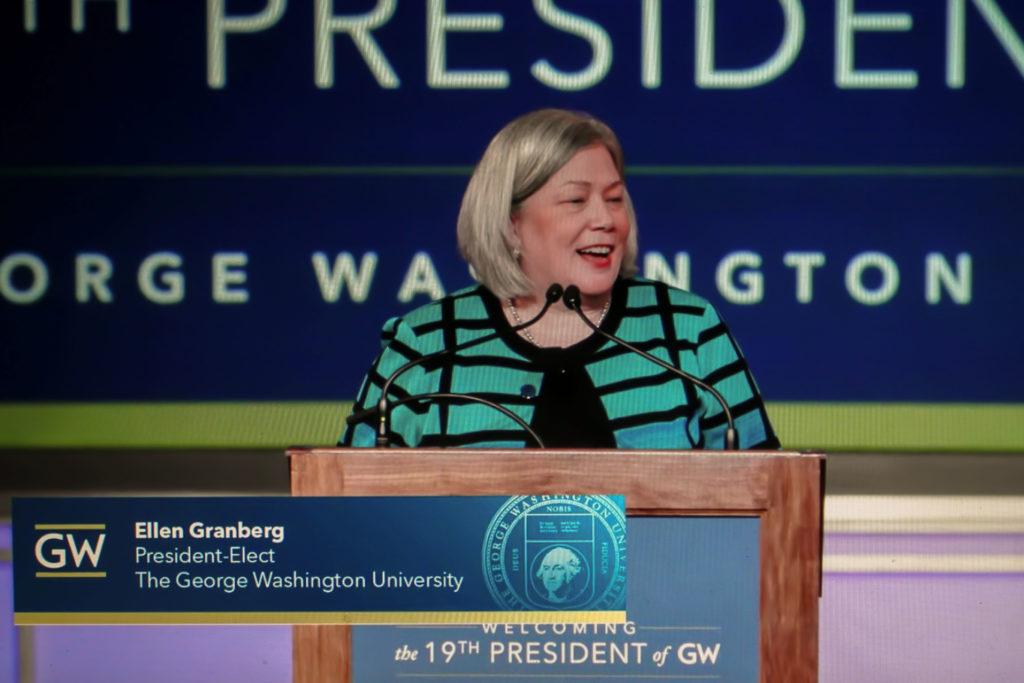Ellen Granberg will lead the University into the next century as GW’s 19th president, officials announced Wednesday.
Officials introduced Granberg, current provost and senior vice president for academic affairs at Rochester Institute of Technology, at a public event Wednesday in the Jack Morton Auditorium. Granberg – the first woman to serve as GW’s president – will take over the helm of GW from Interim University President Mark Wrighton and will begin her term on July 1.
“It was the combination of great ambition embedded in deep community that inspired me, and I hope will inspire all of us as we start GW’s third century together,” Granberg said at the event.
Granberg served as a sociology professor, department chair, associate provost for faculty affairs and senior associate provost at Clemson University before taking over as the provost at the Rochester Institute of Technology in 2018, according to a University release. The release states that she has led strategic planning efforts through shared governance and expanded faculty tenure and promotion processes.
Prior to her career in academia, Granberg worked for the Pacific Bell Telephone Company as a project manager and technical director, according to LinkedIn.
“I’ve worked on health topics in large-scale multidisciplinary teams, and this has given me a deep faith in the power of interdisciplinary science to solve the most complex challenges we face,” Granberg said.
Granberg will replace Wrighton, whose up to 18-month term will expire at the end of June after he assumed the presidency in January 2021. Wrighton had replaced former University President Thomas LeBlanc, who announced his retirement in May 2021 after a faculty-wide survey found a majority of professors were discontent with his leadership.
Board of Trustees Chair Grace Speights said Granberg will “bring together” the University community and “enhance” the University’s academic reputation. She said Granberg is “eager” to collaborate with students, faculty, staff and alumni to achieve University goals.
“The board saw an innovative and dynamic higher education leader with a demonstrated record of supporting teaching and research excellence across all disciplines,” Speights said at the event. “We saw an advocate for fostering diverse and inclusive communities.”
Trustee and alumna Roslyn Brock and Faculty Senate Executive Committee Chair James Tielsch led the search committee for a new president, which included members from the Board of Trustees, faculty, administration, the Alumni Association and the Student Association.
In a series of September meetings that outlined what community members wanted to see in the next University president, faculty, staff and students shared concerns about a lack of resources for research, an inadequate role in GW’s shared governance and frustration with the University’s use of money from fossil fuel extraction companies.
Officials hired Education Executives, a national higher education consulting firm, in June to collect input from the GW community, create a presidential profile and develop an application process for the role of University president.
Speights said in September 2021 that officials were “concerned” about finding a talented candidate for LeBlanc’s permanent replacement due to the number of ongoing presidential searches at universities nationwide and because GW would have to first improve its shared governance principles and collaborative planning to find a qualified, long-term leader.
Officials released a presidential profile in October, outlining the presidential search committee’s goals of finding a candidate who has served as a leader of a large research institution or top government roles. The profile states that officials were seeking a candidate to continue to build trust with the GW community and one who worked at a university with an academic medical enterprise, similar to GW’s, which include the Medical Faculty Associates, School of Medicine and Health Sciences and GW Hospital.
In Wrighton’s interim tenure, the Board of Trustees ditched the Colonials Moniker, officials created shared governance principles between faculty and administrators and began a University-wide diversity review, which is set to wrap up in the spring.
“I vowed that this would be a time of a turning point in the progress of the University,” Wrighton said at the event Wednesday. “And I believe the new president will represent a significant contribution to accelerating the progress of the University.”








